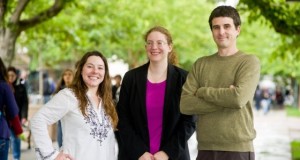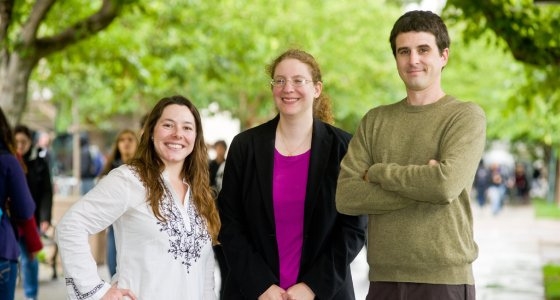
Charlotte Sunseri, Ninian Stein and Dustin Mulvaney bring new scholarship to campus (Robert Bain photo).
(Editor’s note: The following is an excerpt from the fall 2011 College of Social Sciences newsletter, “Together: Exploring What Can Be,” Michael Haederle, editorial consultant. )
The four new assistant professors joining the College of Social Sciences faculty this semester bring diverse and ambitious research agendas that underscore the breadth of the college’s academic mission.
Dustin Mulvaney comes to the Environmental Studies department with an interest in renewable energy technologies and their impacts. Altovise Rogers brings to the Psychology faculty her expertise in industrial/organizational psychology. In the Anthropology department, Charlotte Sunseri researches how long-ago Californians interacted with their environment, while Ninian Stein studies old industrial buildings through archaeological lens.
“With our four bright and talented new professors on board, we look forward to an exciting future for CoSS,” Dean Sheila Bienenfeld says. “These scholars are multi-talented, and bring multiple disciplinary perspectives to their work.”
Mulvaney, a New Jersey native, started out in chemical engineering and worked for a chemical company before changing directions and earning his Ph.D. in environmental studies at the University of California, Santa Cruz.
He developed an interest in the politics of regulation and the balance between innovation and risk. “That got me started thinking about the implications of emerging technologies,” he says. “How do we think about balancing innovation against risk?”
A particular interest involves new innovations in photovoltaic manufacturing. Newer, more efficient solar panels use toxic compounds involving dangerous heavy metals like cadmium and selenium, Mulvaney says. But what happens when it comes time to recycle devices made from these substances?
“We might have an e-waste crisis with solar materials,” Mulvaney says. “These are the kinds of things you might want to think about when you’re innovating in this PV space.”
Rogers became interested in industrial/organizational psychology while an undergraduate at Rice University. On her way to earning a Ph.D. from the University of Houston, Rogers consulted for a variety of businesses, including oil and gas companies, which have elaborate training programs in highly complex technical procedures for their newly hired engineers.
“It’s kind of hard-core training,” she explains, explaining that safety is a critical concern in the industry.
These days, her research interests are veering toward the impact of rapidly evolving mobile communications and social networking on the workplace, where employees increasingly mix personal and business activities. “I’d like to know how that shapes culture and attitudes,” she says.
As she takes on a mixed undergraduate/graduate teaching load this semester, Rogers attributes her commitment to academia in part to her family’s influence.
.
While studying for her Ph.D. in anthropology at UC Santa Cruz, Sunseri focused on Native Americans in Central California in the centuries before European contact. “I was interested in the subsistence of some of these hunter-gatherer groups that were presumed to be small and mobile,” she says. In fact, there was evidence of sophisticated trade networks in the region.
Her new research interest focuses on the mostly vanished town of Mono Mills in the eastern Sierra Nevadas.
“I’m interested in how they created community from these different backgrounds,” says Sunseri.
She hopes that uncovering material culture will shed light on how people in Mono Mills lived. “It can tell us such a different story and give us such a different picture of day-to-day life,” she says.
Stein shares Sunseri’s interest in archaeology and has co-led a dig at a Colonial-era site in Rhode Island, but in recent years she has focused on the untold stories of old New England factories and warehouses.
Stein studied anthropology and environmental studies at Brown University, earned master’s degrees at Harvard (anthropology) and Yale (environmental science) and completed her Ph.D. in anthropology-archaeology at Brown in 2007.
Stein fell in love with archaeology as a child. As her interests matured, she became interested in “understanding how humans related to their environments over time, how they impacted their environments and how they’ve been impacted by their environments.”
Stein is casting an eye around San José for older industrial structures. “I’m on the hunt now for a good site, particularly one where the future is uncertain,” she says. “I’m interested in a site close to campus.”

